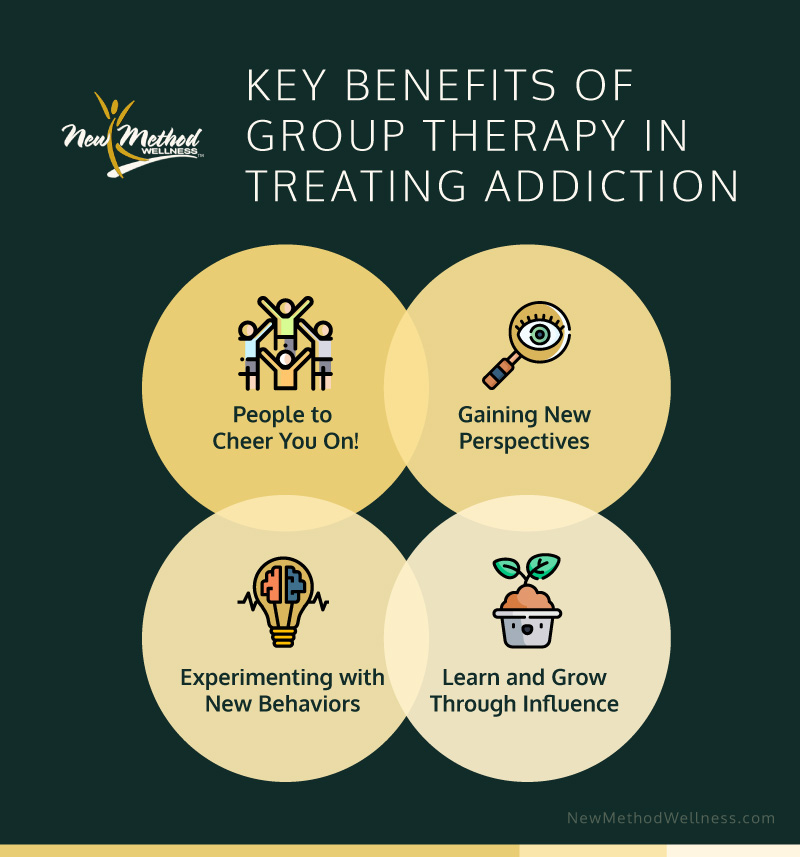If you’re in the midst of addiction recovery, you might be wondering what the benefits of group therapy are. You might be thinking about how hard it is just to share and open up with your individual therapist much less a group of strangers that you don’t know at all. You may wonder if you’ll get adequate time to bring up your own ideas and experiences when everyone else is sharing. Perhaps you’re an introvert who hates discussing personal things with people you don’t know. Should you add a therapy group to your treatment list?
The fact is, these feelings and concerns are normal. Many people in addiction recovery feel uncomfortable at first in sharing their experiences. However, once they get used to talking to their personal therapist, they often also find it easier than they expected to share their thoughts during group therapy. The benefits of group therapy can often be far-reaching beyond addiction treatment.
History of Group Therapy
Group therapy in addiction treatment goes back to at least the early 1900s. Many soldiers returning from the wars of that time period needed treatment for addiction or PTSD or both. Psychotherapy proved to be a very effective way to treat both conditions. Professional therapists began employing group therapy as a way to treat many soldiers struggling with the same issues at the same time. Group therapy began to improve in the following years as it was increasingly used by medical professionals in various fields. Outside of addiction treatment, the benefits of group therapy extend to behavioral health treatment and even physical health problems like cancer. Stanford University doctors reported that women with breast cancer lived an average of 18 months longer if they participated in group therapy.
What Are the Key Benefits of Group Therapy in Treating Addiction?
Group therapy has been used for a long time to treat addiction. It remains popular due to its effectiveness. If you’re in addiction treatment, you should consider adding group therapy to your treatment program for the following reasons:
• It gives you group support in setting and achieving goals in your recovery. It also gives you a group of people to cheer you on.
• Getting the opportunity to have your challenges viewed from another perspective as well as helping others with their challenges. Gaining new perspectives can be very helpful in solving difficulties in your treatment.
• Experimenting with new behaviors and thought patterns in a group therapy safe space allows you to try them on before using them in the real world. You’ll also find out that you’re not alone in experiencing certain emotions and thought patterns.
• Group therapy is possibly one of the most natural ways to overcome the problem of addiction. People instinctively learn and grow through influence from other people, so it makes sense that addiction treatment in groups would work the same way.
Can You Benefit From Group Therapy If You Have Social Anxiety?
Many people in addiction treatment also have co-occurring disorders like depression or anxiety. If you suffer from social anxiety, you might find the idea of group therapy extremely daunting or even scary. Should you still participate? The answer is yes, you should give it a chance during your treatment. It’s important to remember that you only have to share what you want to share when you want to share it. Therapy groups are a way to experience the support of others who are having similar challenges in their treatment and in their lives. It’s very possible and likely that others in your therapy group also have some form of anxiety or depression. You’ll be surprised at how easy it is to share with a compassionate audience. What are the benefits of group therapy for someone with social anxiety? Besides helping you get through addiction treatment, it can help you cope with your anxiety as well.
How Therapy Groups Help Communication
Many people struggling with addiction have difficulty with communication. Even if they don’t have a behavioral health condition like anxiety, they still may find it hard to effectively communicate with others. If this is you, then you should know that therapy groups are very effective at helping people communicate better. It gives you a safe space to say what’s on your mind and also see how people react to it. It often amazes people who participate in therapy groups how easily problems and obstacles can be worked through when you get the opportunity to talk about it with others. Therapy groups also help you cultivate your listening skills. Besides communicating with others in your group, you have the opportunity to be a good listener as well.
What Is a Therapeutic Group In Addiction Treatment?
All groups have the potential to be therapeutic in addiction treatment. This is due to emotional attachments formed between members during sessions. That attachment can influence and change someone in a positive way. Calling a specific type of group therapeutic doesn’t mean that groups outside of therapy cannot also be therapeutic. But, what exactly distinguishes therapy groups as used in addiction treatment from other types of groups?
The following are five types of group therapy used in addiction treatment:
1. Psychoeducational groups, which educate participants about addiction and substance abuse.
2. Skill development groups, which help participants learn skills to cope with stress triggers and break free of addictive behavior.
3. Cognitive-behavioral groups, which deal with negative thought patterns and resulting behaviors that trigger substance abuse.
4. Support groups, which has members countering each other’s negative thoughts and supporting positive change.
5. Interpersonal process group psychotherapy, which gives patients the chance to discuss their history in the present environment of the group. This allows them to rethink various life problems that they previously used substance abuse to cope with.
The first four group models are very common in addiction treatment, but the last one requires extensive professional training for the therapist and long-term commitment from the patients. It’s not as common as the first four, but it is still used to facilitate addiction recovery.
Benefits of Group Therapy Meetings for Addiction and Recovery
At New Method Wellness, we support clients in addiction recovery through outpatient and inpatient treatment models. Group therapy is one of the many treatment programs we use to treat a substance abuse disorder. How often you attend group meetings depends on the program. If you are in residential treatment, you’re likely to attend more meetings than someone in outpatient treatment. However, we will work with you to find the number of sessions per week that are right for your individual treatment plan.
Along with therapy groups, the following list is an example of some of our other treatment programs:
• Art therapy
• Acupuncture therapy
• Nutritional counseling
• Dialectical Behavioral Therapy
• Sand tray therapy
To find out more about New Method Wellness, the benefits of group therapy, and our wide range of effective treatment programs, contact us today at 866.951.1824








